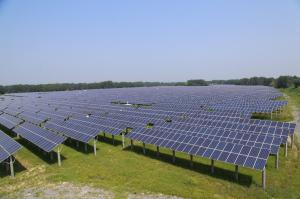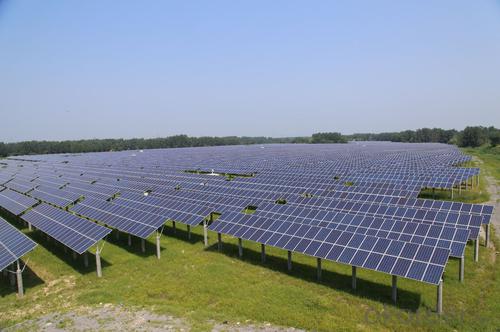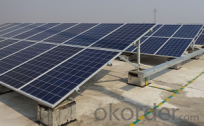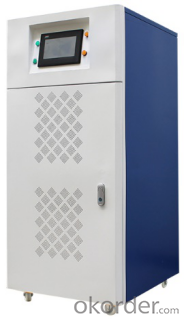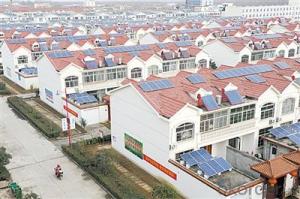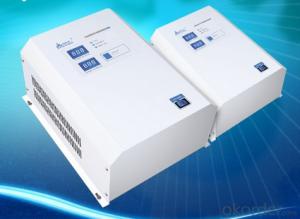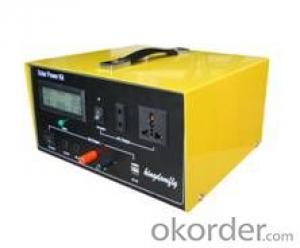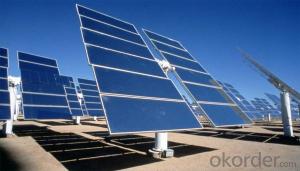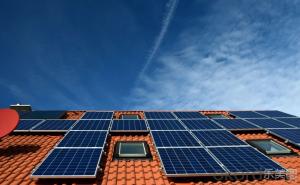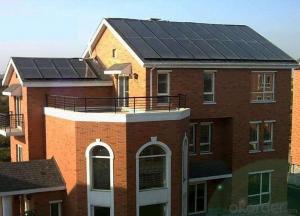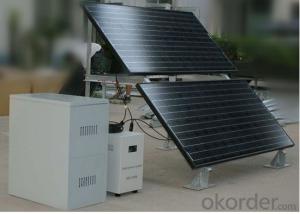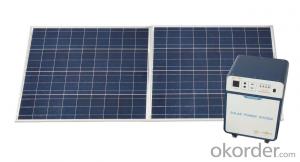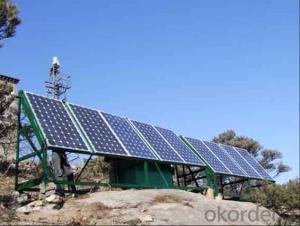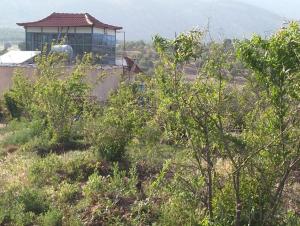30kW Solar Off-Grid Power System - Solar Energy Systems in Geelong
- Loading Port:
- China main port
- Payment Terms:
- TT OR LC
- Min Order Qty:
- 1 set
- Supply Capability:
- 500 set/month
OKorder Service Pledge
OKorder Financial Service
You Might Also Like
Specification
1. Technical parameters of 5kw Solar Off-grid Power System 30KW
-Solar panels
Power(Pmax): 300 Wp
Dimension: 1640x992x40 mm
Working Voltage(Voc): 39.7V
Working Current(Imp):9.32A
Weight: 20 kg
-PV Inverter with controller
Efficiency: >85%
Pure sine wave
AC 220V/380V 50/60Hz output
Working Temp: 0℃~40℃
Battery overvoltage protection,undervoltage protection,overload protection,short circuit protection, overtemperature protection,etc.
650*570*1270mm 180KG
-Mounting Bracket
Flat roof or Ground: Galvanized steel type;
Tile roof: Aluminium type
Wind Load Resistanc: 45m/s
Snow Load: 2kN/m2
-DC Cables
PV1-F
TUV/UL certificates
2. Products images
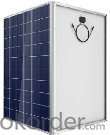
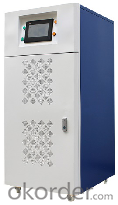
3. Product list
| No. | Item | Spec. | Qty | Unit |
| 1 | Solar Panels | 300W | 99 | pcs |
| 2 | PV Inverter with controller built-in | GSA220 | 1 | set |
| 3 | Controller | 220V 150A | 1 | set |
| 4 | Mounting racks | 30000W | 1 | set |
| 5 | DC Cables | 4mm2 | 500 | meters |
| 6 | AC Cables | 3x16+1x10mm2 | 50 | meters |
| 7 | MC4 Connectors | F&M | 40 | set |
| 8 | GEL Battery | 12V 200Ah | 54 | pcs |
4. Remark
-In rainy days, the battery can support 18500W load work 5hours.
-The maximum power load should not exceed 22KW (including inductive load impact: such as refrigerators, air conditioners, washing machines, etc. with motor load).
-The battery can be fully charged in 5-6hours under STC sunshine condition.
5. Package
Wooden case or carton pallet packing
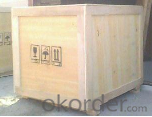
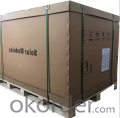
- Q: Can solar energy systems be used in areas with high wind conditions?
- Yes, solar energy systems can be used in areas with high wind conditions. While solar energy systems primarily rely on capturing sunlight to generate electricity, they can still function effectively in areas with high wind conditions. In fact, solar panels are designed to withstand various weather conditions, including strong winds. These panels are typically mounted securely to ensure they can withstand the force of the wind. Additionally, wind conditions can even have a positive impact on solar energy generation. Wind can help to cool down the solar panels, which can increase their efficiency and overall output. Therefore, areas with high wind conditions can still benefit from the installation of solar energy systems.
- Q: Can solar energy systems be used for powering telecommunications towers?
- Yes, solar energy systems can be used for powering telecommunications towers. Solar panels can be installed on or near the towers to harness sunlight and convert it into electricity. This renewable energy source provides a reliable and sustainable power solution for remote or off-grid locations, reducing dependence on traditional grid electricity and lowering operating costs.
- Q: Can solar energy systems be used in powering music studios or recording studios?
- Yes, solar energy systems can be used to power music studios or recording studios. Solar panels can generate electricity to meet the power demands of these facilities, providing a clean and sustainable energy source. This can help reduce electricity costs and carbon footprint while ensuring a consistent power supply for the studio's equipment and operations.
- Q: How do solar energy systems contribute to reducing the risk of power outages during extreme weather events?
- Solar energy systems can help reduce the risk of power outages during extreme weather events by providing a decentralized and reliable source of electricity. Since solar panels generate electricity directly from sunlight, they are not dependent on the traditional power grid, which is vulnerable to damage during storms or other severe weather conditions. By harnessing solar energy, individuals and communities can maintain access to power even when the main grid fails, reducing the impact of power outages and increasing resilience during extreme weather events.
- Q: Are there any government incentives or rebates for installing solar energy systems?
- Yes, there are government incentives and rebates available for installing solar energy systems. These incentives vary by country and region, but they often include tax credits, grants, and rebates to help offset the initial costs of installation. Additionally, some governments offer feed-in tariffs, which allow solar energy system owners to sell excess electricity back to the grid at a premium rate. It is advisable to check with local government agencies or consult with a professional to understand the specific incentives available in your area.
- Q: Can solar energy systems be used in areas with high levels of air humidity?
- Yes, solar energy systems can be used in areas with high levels of air humidity. While high humidity can affect the efficiency of some components, such as reducing the effectiveness of solar panels, it does not render solar energy systems completely unusable. In fact, solar energy systems are deployed and successfully function in many high-humidity regions around the world. Additionally, advancements in technology and design have improved the performance of solar panels in humid conditions. For instance, anti-reflective coatings on the panels can help prevent moisture buildup and ensure better performance. Overall, while humidity may slightly impact the efficiency of solar energy systems, it does not prevent their use in areas with high levels of air humidity.
- Q: How do solar energy systems impact wildlife habitats?
- Solar energy systems can have both positive and negative impacts on wildlife habitats. On one hand, they can help reduce greenhouse gas emissions and mitigate climate change, which can benefit many species by preserving their natural habitats. Additionally, solar installations can serve as a habitat for certain species, providing shelter and food sources. However, there are also potential negative impacts, such as the loss of vegetation and disruption of ecosystems during the construction and operation of solar farms. It is important to carefully plan and manage solar installations to minimize these impacts and ensure coexistence with wildlife habitats.
- Q: Can solar energy systems be installed on camping sites?
- Yes, solar energy systems can be installed on camping sites. These systems can provide a sustainable and convenient source of power for campers, allowing them to charge small electronic devices, run lights, and even power small appliances. Additionally, solar energy systems are portable and can be easily set up and taken down, making them a practical choice for camping sites.
- Q: What is a photovoltaic (PV) system?
- A photovoltaic (PV) system is a technology that converts sunlight into electricity. It consists of solar panels made up of photovoltaic cells, which generate direct current (DC) electricity when exposed to sunlight. This DC electricity is then converted into alternating current (AC) electricity using an inverter, making it suitable for use in homes, businesses, and even large-scale power plants. PV systems are a sustainable and renewable energy solution that helps reduce dependence on fossil fuels and mitigate climate change.
- Q: What happens to excess solar energy produced?
- Excess solar energy produced can be stored in batteries for later use, fed back into the grid, or utilized to power other devices or systems such as heating or cooling systems.
Send your message to us
30kW Solar Off-Grid Power System - Solar Energy Systems in Geelong
- Loading Port:
- China main port
- Payment Terms:
- TT OR LC
- Min Order Qty:
- 1 set
- Supply Capability:
- 500 set/month
OKorder Service Pledge
OKorder Financial Service
Similar products
Hot products
Hot Searches
Related keywords
